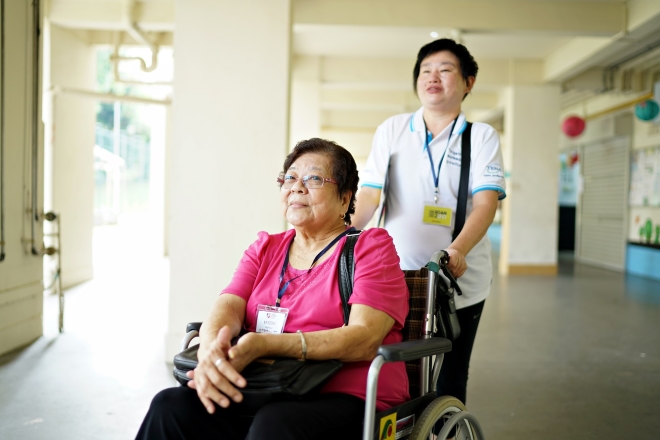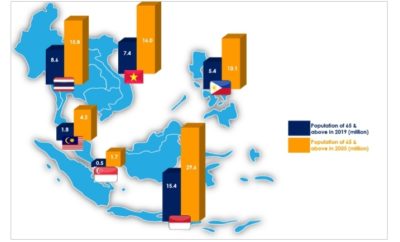
Insights + interviews
The state of elderly care in Singapore
The rising cost of elderly care may strain Singapore’s strong financial footing if the rising cost of caring for the elderly is not managed. Education, which can help with families managing elderly relatives can reduce public spending.
A natural effect of aging is an increased likelihood of health problems, which often requires some form of care such as hospitalisation or home nursing. According to a recent Marsh & McLennan Companies report, the elderly healthcare costs in Singapore are projected to rise to more than US$49 billion annually by 2030. This i s likely to put a strain on current and future resources, as public spending will undoubtedly increase to take care of the incoming silver tsunami and their healthcare needs. This increase in public spending in healthcare is to be paid for by the incoming hike in GST from 7% to 9%. This is so as PM Lee has cautioned against drawing on reserves to fund the increase healthcare spending instead.
Singapore’s shrinking population has been remarked as a “ticking time bomb”. It has been predicted that the gap between the young and old in Singapore is expected to widen considerably, in so far that Singapore will be on a similar footing with current day Japan, the oldest society in the world. This has implications on society as large as there is a lesser base of descendants able to support the elderly. While the government has introduced schemes such as the Pioneer Generation Package and the recent Merdeka Generation Package to offset medical costs for the elderly, there is much that we, as Singaporeans can do to help improve the current situation for the elderly. There needs to be a coordinated effort to improve education through the schools and community programmes, that focuses on elderly care.
By focusing on education, we can raise a more aware generation that can effectively manage the elderly and hopefully, improve the current conditions and situation for many elderly people in the country. However, it isn’t a simple or single solution that will solve the issue. It requires participation from the public and private sector, as well as the community being able to accept and adapt to an aging population.
The role of the education system
The catalyst for change often starts at a young age, so incorporating elderly care education into the syllabus will be crucial in helping students understand the need and efforts required in managing their grandparents, elderly relatives and eventually their parents.
If kids are educated on the topic from as early as primary level, it can help mold the upcoming generation’s understanding and acceptance of the elderly. However, this is a long-term solution and can help lower the cost of healthcare for the elderly by helping improve preventive health efforts by families for their loved ones as they age, thus reducing the need for expensive treatments as they grow older. Also, families can be more self-reliant in managing care for their elderly relatives, reducing the cost to the country for old-age care.
Community outreach is crucial
In light of Singapore’s shrinking population, it is increasingly important for the community to band together to provide dignified social support to seniors beyond the hospitals into the realms of our neighbourhoods and homes. Currently, there are programmes set in place by the government, such as the Active Ageing programme, which are rolled out via Singapore’s strong network of community centres to engage and empower seniors across the country. Teamwork in the community is evident in the Community Network of Seniors, an initiative by the agency of integrated care, that aims to link up the necessary health and social service support services and make it available in the neighbourhoods. It is a huge network of Voluntary Welfare Organisations (VWO), grassroots and community groups as well as government agencies that come together to work towards accessibility of these services. However, these efforts are largely dependent on the hardworking volunteers, usually fellow neighbours, that take on the important responsibility of looking out for one’s elderly residents in the area. Community volunteers such as the Pioneer Generation Ambassadors, are befrienders to the elderly who will take them to health screenings, encourage them to exercise with other seniors and link them up with fellow friends in the neighbourhood. Since this began in 2014, volunteers have reached out to 70% of the estimated 490,000 seniors across Singapore.
That said, such effective efforts were made possible through the efforts of volunteers. In order to sustain the multiplying effect the community has on the senior citizens in Singapore, it is essential to nurture the spirit of volunteerism of Singaporeans, young and old. Beyond the aspirational 5 Cs, the sixth C, caring for the community, should be a priority as we have a responsibility for one another as fellow citizens of Singapore. Minister for Culture, Community and Youth, Grace Fu, remarked in a keynote address that Singapore hopes to double its volunteerism rate from one in three currently to 70% in 5 years’ time. In order to build a caring society, the foundations of volunteerism must be set to engender the kampung spirit and a culture of care in our neighbourhoods. Educational efforts on the hows and whys of volunteering become increasingly crucial to reach this goal of Singapore as a giving nation with a volunteer in every household.

The private sector has a part to play
Besides community outreach, the private sector can step up and play their part. Corporate CSR programmes, including donation drives and regular activities, can supplement the ongoing public efforts while easing the need for public funds. More effort is required to educate companies on how they can contribute money, time and effort in helping tackle the aging population.
There are organisations like the Home Nursing Foundation (HNF), which make great partners and help companies contribute their time or money into helping the elderly in need. From large donations to small charity events, like the recent NTUC FairPrice, TENA, and HNF event, which brought 18 seniors out for lunch and a shopping trip.
If more companies got involved on a regular voluntary basis, this can help fund more great initiatives by organisations like HNF and provide a welcome activity for those who really need it.
While this may be a short-term solution, creating a culture of giving and selflessness does translate beyond the job. This will tie in with the community and education programmes to alleviate the inevitable strain on public spending.
In the meantime, here are some simple things* you can do for your elderly relatives who either stay with you or when you visit them at their house.
Elder-proof the living spaces
To ensure that the home is safe and secure, reduce clutter as possible. Store or discard any hazards such as loose rugs and exposed electrical wires. For the wheelchair-bound, make sure there is enough space to move around easily and install handicap-accessible devices where necessary in areas such as bathrooms and bedrooms.
Help plan a daily hygiene routine
Good hygiene is essential in staying healthy and feeling good. So make sure to help them plan a daily hygiene routine such as regular brushing of teeth, and bathing.
Plan a meal schedule
Skipping meals is another common problem for those who live alone. If they are unable to cook, help them plan meal delivery so they can receive regular meals.
Encourage participation in activities
Maintaining your mental health is equally important. Help your elderly relatives start a hobby, join a club, or sign up for social activities will help prevent social isolation and allows regular contact with other people or meet new friends.
*sourced from the Home Nursing Foundation website
Article contributed by Benny Wong, Commercial Director Singapore, The Philippines, and Indonesia at Vinda Singapore Pte Ltd
Pictures provided courtesy of Vinda Singapore.









